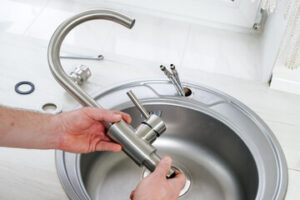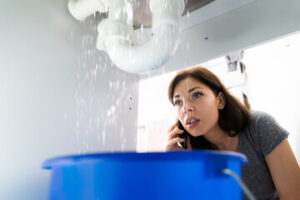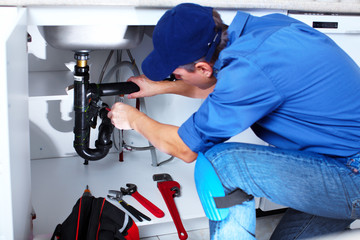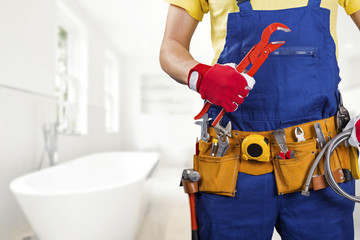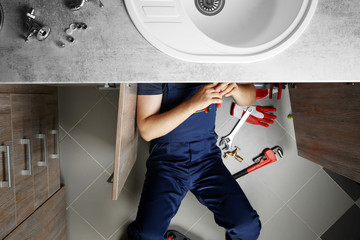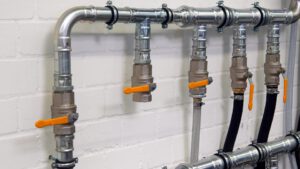Drain Cleaning Delaware County in your home can become clogged with hair, dirt, soap residue, and other debris. When this happens, using a professional drain cleaner is important to prevent future problems with your home’s plumbing system.
Many people use store-bought chemical drain cleaners. However, these chemicals are damaging to your pipes and the environment.
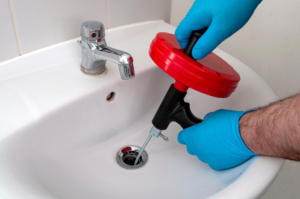
Chemical drain cleaners are designed to unclog pipes with a mix of potent, fast-acting chemicals. They are available in liquid form and can often be purchased at your local hardware store or drugstore. Chemical drain cleaners dissolve hair, paper products, grease, and other organic materials that build up in your pipes over time. However, these products can be dangerous if mishandled and cause serious damage to your pipes if used incorrectly.
Most chemical drain cleaners use toxic fumes that irritate your nose, throat, and eyes. They also pose a health risk by releasing volatile organic compounds into the air, which can cause respiratory problems. These cleaners can also contaminate the environment by seeping into groundwater and damaging the surrounding ecosystem.
If you use a chemical drain cleaner, follow the product’s instructions carefully and wear gloves and safety goggles when applying it. It’s also important to note that these products are only effective for clogs within a few feet of the drain opening. If your clog is further down the line, it may require the help of a professional plumber to remove it.
There are three main types of chemical drain cleaners: caustic, oxidizing, and acidic. Caustic drain cleaners contain high concentrations of hydrochloric or sulfuric acid. They create a chemical reaction with the material in your pipes that decomposes the clog and releases heat to melt congealed grease. These cleaners are usually safe if the clog is near the pipe opening, but they can be harmful if used repeatedly or on older pipes.
Oxidizing and acidic cleaners don’t generate as much heat as caustic drain cleaners, but they still dissolve blockages and release hydrogen gas that corrodes metal. These cleaners can be extremely hazardous if mixed with water or certain metals and can burn your skin if you come into direct contact with them.
Inhaling these cleaners can wreak havoc on your respiratory system and kill any good bacteria in your pipes, leading to recurring clogs. They are also very difficult to use if you have a septic tank, and they can damage polyvinyl chloride or PVC pipes.
Unlike chemical drain cleaners, which can cause damage to pipes and drain lines over time, biological drain cleaners are safe for use in all pipe materials. These all-natural products contain bacteria that can break down organic waste material into water and carbon dioxide, which are then flushed out of the drain line. Biological drain cleaners can regularly clear and free-flow your drain lines.
There are several different kinds of bio-drain cleaners, but most work similarly. They are often sold as a liquid you pour down the drain, but some come in powder form. Both types require that the drain be fully empty before applying the cleaner. Once the product is poured into your drain, it should be left to work for at least six to eight hours, ideally overnight.
Most drain clogs are caused by the buildup of organic matter on the inside of your pipes and drain surfaces. These materials can include food waste, animal and vegetable fats, and undissolved soap scum. Bacterial drain cleaners can eliminate these materials by introducing “good” bacteria to your plumbing system that can digest them. This process is called biodegradation, and it can remove even the most stubborn clogs without damaging your pipes and drain surfaces.
Unlike caustic chemical cleaners, bacterial drain cleaners can safely be used in all pipes and septic systems. They are safer for children and pets than chemical cleaners and don’t release harmful fumes. Bacterial drain cleaners can restore and maintain a healthy pH balance in drain lines and septic tanks.
Biological drain cleaners are available at many hardware stores and big box retailers. They are usually priced less than chemical cleaners and may be more effective. However, you should consult a plumber before using any drain cleaning product, as they are not all created equal. Some may be more effective and have a much shorter shelf life. Some can also be dangerous if mixed with other chemicals, such as vinegar and baking soda.
Yes, baking soda and vinegar can help unclog a drain, but it’s probably not the best method for serious clogs. This is because the chemical reaction between the two substances creates carbon dioxide, which fizzes and foams but does not do much to physically clear debris from your pipes. It is more effective for removing soap scum and buildup, but physical clogs like hair usually require either a plunger or a drain snake.
To use baking soda and vinegar to clear a drain, first empty the sink or tub of all water. Pour in about a cup of baking soda and distilled white vinegar. You should notice a fizzing reaction, similar to the volcano experiment you staged in science class when you were younger. The reaction is caused by the acetic acid in the vinegar mixing with the sodium bicarbonate in the baking soda to create carbon dioxide, which can dislodge some clogs. Then, wait about five minutes, and slowly pour a cup of boiling water to flush out the drain.
If you don’t want to wait for the bubbling reaction, you can also try pouring the baking soda and vinegar into your drain through a colander or strainer. This method may take a little longer, but it can be more effective at breaking up some clogs.
Baking soda can also be used to clean the inside of your drains and garbage disposal by rubbing a paste over the interior surface. It can help remove odors and prevent grime buildup, but it does not work well on grease and other oils because it cannot disperse them into water like detergents do. Also, pour a small amount of baking soda down your drain once a week to keep it fresh and smelling good. While cleaning the drain, you can use a damp cloth or sponge to scrub any stuck-on gunk and stains. Just be sure to rinse the drain thoroughly afterward so that any residue is gone.
Unlike liquid drain cleaners with a wide range of chemical compounds, a plumber’s snake has a single ingredient: steel wire. Also known as a drain auger, this long, flexible metal cable can dislodge even the most stubborn clogs. The wire has a helix-like hook with a gap between the coils, and you turn a crank to move the hook through your pipes. A plumbing snake is typically used for clogs too big for a plunger to handle. Cooking grease that solidifies, hair clumps in the drain, and objects dropped down the drain—like toys or butter knives—can all create difficult-to-reach blockages.
Before you begin snaking, ensure the water in your drain pipe is still flowing. This will help prevent accidental splashes and ensure your plumber’s snake can work through the clog without getting stuck inside your pipes. Next, you’ll need to open your drain’s cover or remove the trap arm if it is removable. This gives you the best access to the drainpipe and can help you identify any obstructions blocking your clog.
Once you’ve removed the drain cover or p-trap, insert the head of your plumbing snake into the drain or pipe. You should feel some resistance as the cable moves through the clog. If you don’t, the clog is likely located somewhere else. If you do, continue snaking by rotating the snake’s head back and forth and up and down.
When you feel the hook latch onto a clog, rotate the handle of your plumbing snake clockwise and apply pressure to feed it deeper into the pipe. If the clog is large, breaking up and removing it from your drain pipe will take some time.
Once the clog is gone, close your drain cover or p-trap arm and flush the toilet to ensure everything works properly. Remember, if you have trouble removing a clog or notice that the water drains slowly, it’s a good idea to call a professional. The last thing you want is to try to fix the problem yourself and cause more damage to your drain or pipes.
